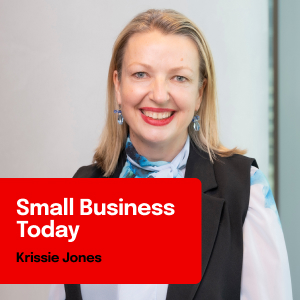Protecting your business online is simpler than you think. NAB Executive Business Direct and Small Business, Krissie Jones, shares practical advice on how you can get started.


Newsletter
Scams: Education, training & slower payment processing to minimise scams and cybersecurity risks.

NAB research shows consumers and businesses are increasingly prepared to make trade-offs for greater protection from scams. Over 4 in 10 Australian consumers would be “extremely prepared” to experience slower payments processing if they were better protected from scammers, and 1 in 2 SMEs are “completely prepared” to sacrifice the time it takes to process a payment if it’s safer. And, while over 4 in 10 Australians are being very proactive in getting educated about scams, just 15% of Australian SMEs conduct extensive training around scams and other cybersecurity risks.
What actions do Australians think are most effective in stopping them from being scammed?
Around 3 in 4 believe not opening suspicious texts, pop-up windows or clicking on links or attachments in emails and keeping their personal details secure are most effective. 2 in 3 also believe keeping mobile devices and computers secure, never sending money, credit card and online account details or copies of personal documents to anyone they don’t know, not responding to phone calls about their computer asking for remote access, being careful when shopping online, being more alert to the fact scams exist, being wary of unusual payment requests, and choosing passwords difficult for others to guess and updating them regularly are also most effective. Only 1 in 2 think reviewing privacy and security settings on social media would keep them safe.
Are Australian consumers proactively getting educated about scams?
They are being “quite” proactive, scoring a solid 6.9 pts. Encouragingly, over 4 in 10 were “very” proactive, with fewer than 1 in 10 “not very” active. The extent Australians were being proactive increased with age irrespective of gender (rising from 5.9 pts for men 18-29 to 7.7 pts for men over 65, and 5.9 pts for women 18-29 to 7.6 pts for women over 65). Women and men in the same age groups scored proactiveness broadly the same. The number who scored “high” levels of proactiveness increased sharply with age – it doubled from 29% for men 18-29 to 59% for men over 65, and from 30% for women 18-29 to 57% for women over 65.
Are Australian consumers prepared to experience slower payments processing if they were better protected from scammers?
They are “quite” prepared to, scoring 6.9 pts out of 10. Over 4 in 10 Australians are also “extremely” prepared to do so, and fewer than 1 in 10 “not very” prepared to. Women scored higher than men in all age groups except the 50-64 group. The number of people who scored “high” increased significantly with age – from around 1 in 4 in 18-29 age groups to around 2 in 3 in over 65 age groups. Willingness to sacrifice convenience for security rated a little higher in rural areas (7.0 pts) than in capital and regional cities (6.9 pts), with more consumers in rural areas (47%) “extremely” prepared to experience slower payment processing times than in regional and capital cities (43%).
© National Australia Bank Limited. ABN 12 004 044 937 AFSL and Australian Credit Licence 230686.